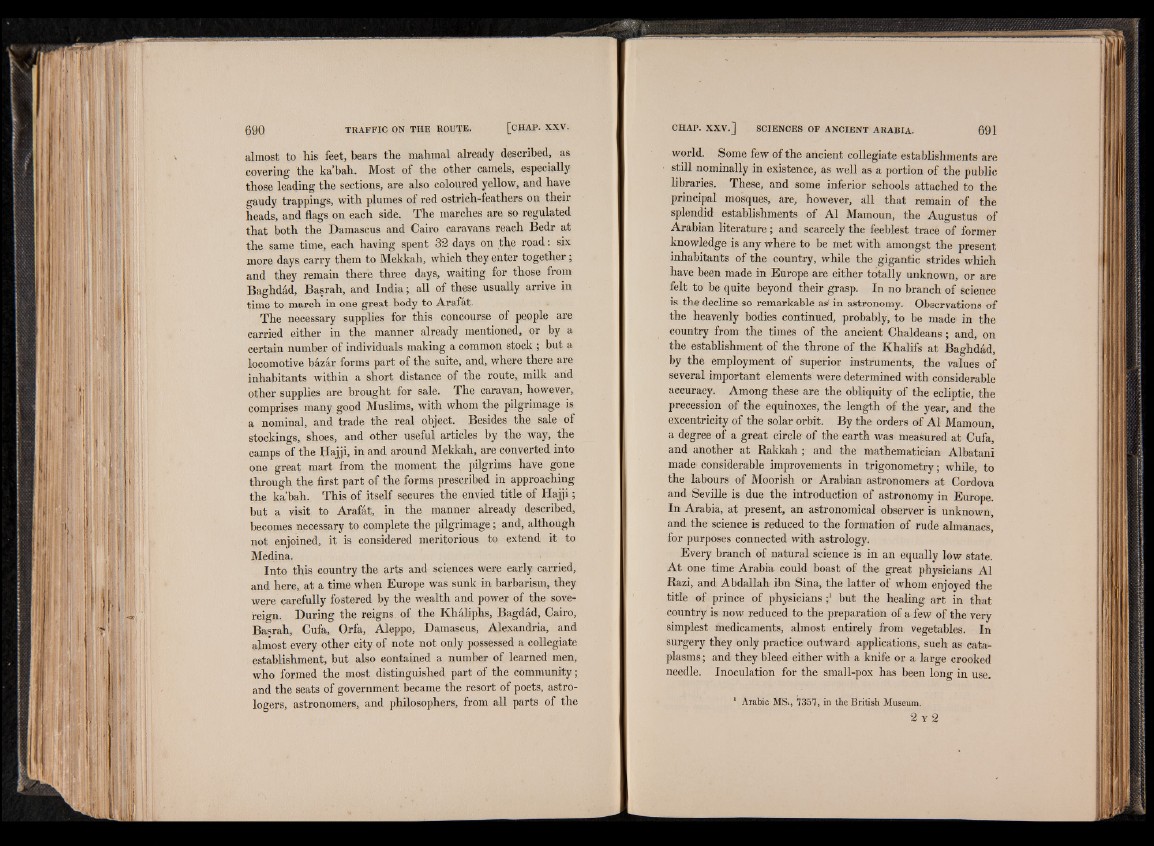
almost to his feet, bears the mahmal already described, as
covering the ka’bah. Most of the other camels, especially
those leading the sections, are also coloured yellow, and have
gaudy trappings, with plumes of red ostrich-feathers on their
heads, and flags on each side. The marches are so regulated
that both the Damascus and Cairo caravans reach Bedr at
the same time, each having spent 32 days on the road: six
more days carry them to Mekkah, which they enter together;
and they remain there three days, waiting for those from
Baghdad, Basrah, and India; all of these usually arrive in
time to march in one great body to Arafat.
The necessary supplies for this concourse of people are
carried either in the manner already mentioned, or by a
certain number of individuals making a common stock ; but a
locomotive bazar forms part of the suite, and, where there are
inhabitants within a short distance of the route, milk and
other supplies are brought for sale. The caravan, however,
comprises many good Muslims, with whom the pilgrimage is
a nominal, and trade the real object. Besides the sale of
stockings, shoes, and other useful articles by the way, the
camps of the Hajji, in and around Mekkah, are converted into
one great mart from the moment the pilgrims have gone
through the first part of the forms prescribed in approaching
the ka’bah. This of itself secures the envied title of Hajji;
but a visit to Arafat, in the manner already described,
becomes necessary to complete the pilgrimage; and, although
not enjoined, it is considered meritorious to extend it to
Medina.
Into this country the arts and sciences were early carried,
and here, at a time when Europe was sunk in barbarism, they
were carefully fostered by the wealth and power of the sovereign.
During the reigns, of the Khaliphs, Bagdad, Cairo,
Basrah, Cufa, Orfa, Aleppo, Damascus, Alexandria, and
almost every other city of note not only possessed a collegiate
establishment, but also 6ontained a number of learned men,
who formed the most distinguished part of the community;
and the seats of government became the resort of poets, astrologers,
astronomers, and philosophers, from all parts of the
world. Some few of the ancient collegiate establishments are
still nominally in existence, as well as a portion of the public
libraries. These, and some inferior schools attached to the
principal mosques, are, however, all that remain of the
splendid establishments of A1 Mamoun, the Augustus of
Arabian literature; and scarcely the feeblest trace of former
knowledge is any where to be met with amongst the present
inhabitants of the country, while the gigantic strides which
have been made in Europe are either totally unknown, or are
felt to be quite beyond their grasp. In no branch of science
is the decline so remarkable as* in astronomy. Observations of
the heavenly bodies continued, probably, to be made in the
country from the times of the ancient Chaldeans; and, on
the establishment of the throne of the Khalifs at Baghdad,
by the employment of superior instruments, the values of
several important elements were determined with considerable
accuracy. Among these are the obliquity of the ecliptic, the
precession of the equinoxes, the length of the year, and the
excentricity of the solar orbit. By the orders of A1 Mamoun,
a degree of a great circle of the earth was measured at Cufa,
and another at Rakkah ; and the mathematician Albatani
made considerable improvements in trigonometry; while, to
the labours of Moorish or Arabian astronomers at Cordova
and Seville is due the introduction of astronomy in Europe.
In Arabia, at present, an astronomical observer is unknown
and the science is reduced to the formation of rude almanacs,
for purposes connected with astrology.
Every branch of natural science is in an equally low state.
At one time Arabia could boast of the great physicians A1
Razi, and Abdallah ibn Sina, the latter of whom enjoyed the
title of prince of physicians but the healing art in that
country is now reduced to the preparation of a few of the very
simplest medicaments, almost entirely from vegetables. In
surgery they only practice outward applications, such as cataplasms
; and they bleed either with a knife or a large crooked
needle. Inoculation for the small-pox has been long in use.
1 Arabic MS., 735*7, in the British Museum.